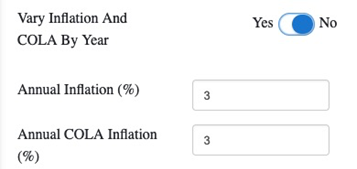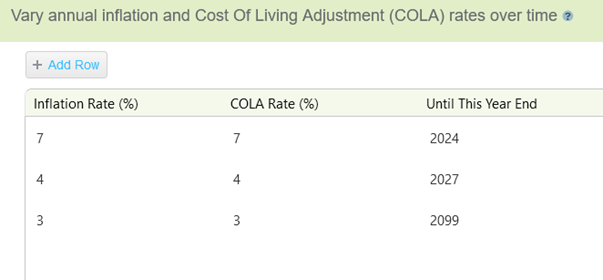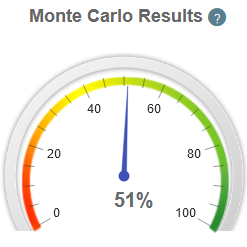Key Points
- Changes to laws related to retirement happen with surprising frequency.
- Most recently, changes have been made to rules related to RMDs, Medicare, retirement account contributions, and more.
- Keeping on top of these changes using a program like WealthTrace can help you make smarter decisions and more accurate projections.
We're into March already (how did that happen?), but that doesn't mean it's too late to adjust your retirement plan based on new laws and regulations that have recently been enacted for 2023.
Let's take a look at how, or if, some of these changes might affect you and your retirement plan.
Your RMDs. You now don't have to take them until you're 73, up from 72 previously. Or, depending on how old you are, you might not need to take them until you're 75 (that change happens in 2033). WealthTrace has you covered here--we have incorporated these changes into the program.
Medicare Part B. When was the last time you looked at your Medicare Part B cost estimates? If you're not retired yet, the answer might very well be "never." Even if you are retired, it may have been a while. Either way, there's some good news: That premium has gone down a bit. It probably won't make much of a difference to your plan, but it's at the very least a good reason to revisit your assumptions about what supplemental Medicare coverage will cost you.

Social Security. High inflation has led to a big increase boost to Social Security benefits. The cost-of-living adjustment (COLA) for Social Security is 8.7% in 2023. That's the largest increase in more than thirty years.
Let's take a detour here for a second and take a look at what inflation could mean for a retirement plan.
If you haven't looked at your plan in a while, your figures for both inflation and COLA might be too low. By default, WealthTrace puts both of those numbers at 3%--totally reasonable and even conservative under normal circumstances. (It's worth mentioning here that the Federal Reserve Bank's target inflation rate is still at 2%.) But these aren't normal circumstances.
Changes to inflation and COLA can make a dramatic difference to a plan, and not always in ways you might expect. Consider a couple in their mid 40s hoping to retire in their mid 60s. They have amassed a portfolio of about $1.7 million, and are contributing $10,000 a year to their retirement accounts (and should be trying to do a lot more). They plan to switch up their asset allocation, currently in about 90% stocks, to something more conservative once they get to their mid 70s.
If they assume straight, year-in, year-out inflation and COLA numbers of 3% each, their Monte Carlo results are in the 63% range.

That 63% number is not going to fly, and they'll need to make some adjustments (like saving and investing more) to make this plan work, regardless of what's going on with inflation and increases to Social Security benefits.
But given what has been happening with inflation in recent years, it's probably a good time to put WealthTrace's ability to vary inflation and COLA rates over time to use. This is what that looks like:

The above image is not a prediction; we're not in the business of trying to forecast inflation rates. It's simply meant to illustrate what you can do with this feature.
But as you can see, in modeling this case, we're assuming inflation stays high through the end of next year; is still higher than normal through the end of 2027; and then goes to 3% for the remainder of the plan. We've also assumed COLA adjustments keep up with inflation, which has been generally true over time.
When we run these number through the plan and their probability of never running out of money declines as we would expect.

If inflation hits when you no longer have salary income, you'll want to have income sources that keep up with it (which is what COLA as it relates to Social Security is all about). If you don't, you'll effectively have less money than you think.
We in the U.S. were pretty complacent about inflation for a long time. Its return is a reminder that it's a good idea to stress test your retirement using a variety of inflation assumptions.
Contributions To Retirement Accounts. Are you one of those diligent savers who religiously maxes out their contributions to their retirement- and tax-advantaged accounts? We have some good news for you in that case, though if you're that diligent about it, you might already know.
- You can now contribute up to $22,500 to your 401(k), 403(b), and similar plans. That's a nearly 10% boost over 2022's limits.
- If you're 50 and over, you can add $7,500 to that above figure. That so-called catch-up amount is up from $6,500 last year.
- Contribution limits for IRAs have gone up as well, from $6,000 to $6,500. The 50+ crowd can make that $7,500.
- It's not exactly in the same category, but contribution limits to health savings accounts (HSAs) have also gone up. Families can put away up to $7,750, subject to certain regulations. That's a nearly 6% boost over 2022.
Set It, But Don't Forget It
Your retirement plan should always be thought of as a work in progress. That's because of constant changes to rules and regulations like the ones mentioned above, but also because life does not stay static for very long. What may seem like a great plan today might need to be revised five years from now due to externalities (like persistently high inflation), or due to things happening closer to home (like an expanding family or a move across the country). Using a program like WealthTrace is the best way to keep on top of it all.
Do you have a retirement plan in place? If not, sign up for of free trial of WealthTrace to get started on your financial and retirement planning.